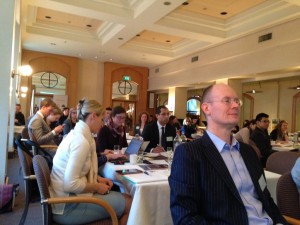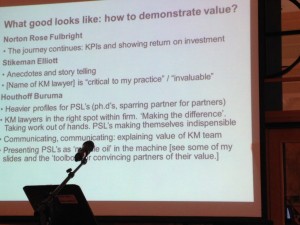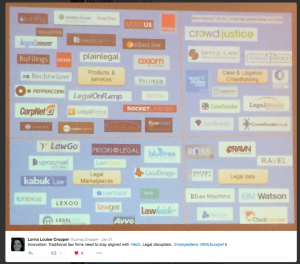Last week was fun. It started with a Masterclass, jointly presented with Eric Hunter, and continued at the first combined KMUK / KM Legal event now styled the KM Summit expertly compiled by Nick Stone which I had the pleasure of closing.
I took away
- A sense that KM’ers are becoming increasingly agile: despite the onrush of technological disintermediation there is still a role (especially around the 4 ‘ates – Facilitate, Collaborate, Communicate and Curate).
- The need for KM’ers to take more ownership of such as Expertise Discovery and technological solutions. Failure to be in the centre will ensure you forever remain on the periphery.
- The importance of Humanics: a technological literacy; a data literacy; and a human literacy; if you want to prosper in an AI environment. (See detailed comments below)
- That ISO KM Standards are now in the final stages before publication end Q3 2018.
Preserving our history
“Never been more important to have reliable evidence we can trust. We are in an arms race with the forces of fakism” said John Sheridan, Digital Director of the National Archives, who gave the penultimate presentation at this year’s KM Summit. His topic:”Using blockchain to create trust in digital records” described their Project Archangel:
A two year project researching the long term sustainability of digital archives through new transformational DLT solutions that will ensure both accessibility and integrity of digital archives whilst maximizing their impact through novel models for commodification and open access.

As John noted, The National Archives, as custodian of a country’s past, need to have reliable digital records. Today it has never been easier to produce fake news or videos. Our past needs preserving in a secure environment so that history cannot be rewritten and laws ignored. This slide sums it up well.
So how might you well ask does that impact the Knowledge & Information Management profession? Greatly I would suggest. Organisations are not immune to fakism either and need trusted sources of content if they are to make effective decisions. I’ve banged on before about Curation (one of the 8 ‘ates – competencies – I suggest all good KM’ers need to have in their armoury) and this presentation underscored it’s importance. I shall be watching the outcomes with interest as the value of Blockchain (distributed ledger technology) apart from cryptocurrency is record keeping with significant potential as a receptical for Knowledge Assets.
I enjoyed
- A couple of wonderful impromptu dinners at Saucy (Greek Deli / Kitchen in Bloomsbury) with Kim Glover, Nicky Leijtens, Eric Hunter, Chris Fyfe, Philippa Von Seth, Monica Teixeira Andre and Virginie Buseine-Picard
- Hearing Monica Pereira a lawyer from Lisboa describe winning Chefs Academy (Portugal’s equivalent of Masterchef) in 2015.
- The buzz around the combined event. It was more than a series of “Show and Tell” sessions, there was active engagement and discussion.
I missed
- Much of the discussion around AI that took place in KM Legal where much of the automation of roles is taking place. The KM UK stream was noticeably quiet on the topic apart from a discussion around the replacement of call centres by chat bots. I did like one of Andrew Trickett’s tweets:
- Is KMs role with AI to be like a Tamagotchi or in a few years time will it be completely different?
- Any discussion about AI technology’s ability to mine and integrate with legacy systems. This, on the impact of AI and the discipline of Humanics, from AI expert, and the President of Northeastern University, Joseph Aoun, was in my mind having heard his presentation at Chatham House:
-
People are going to lose professions at all levels, not just blue collar or white collar. The AI revolution is colour-blind. Every profession that can be turned into a process will be turned into a process.
Humanics is essentially the integration of three literacies: a technological literacy, a data literacy and a human literacy, and what I’m saying is that every learner should be – master the three literacies and integrate them. The technological literacy is the literacy that will allow the learner to understand computing, computers and how they operate. The data literacy is to understand how to navigate the sea of information that is generated by these artificial systems. And the human literacy is the literacy that is unique to human beings, that so far, artificial systems cannot emulate. And you know them, we practice them, it’s the ability to be innovative, to be entrepreneurial, the ability to be culturally agile, to work with people, to understand their body language when you work with them. To understand the global setting, to see opportunities to help people and to impact people. What I’m saying is that every learner should master the three literacies. That should be the base of knowledge.
-
I was surprised
- EY have a giant ‘bucket’ (The Discover) platform for shareable content. It’s integrated with people profiles. But it was not clear to me whether or not Discover sits outside of the enterprise search platform.
- That few people talked about how Social Enterprise Tools such as Workplace by Facebook are becoming “KM” in their organisations.
- That KM’ers can still function in pockets of excellence in large organisations oblivious to others doing similar roles oftern called something different. It happened twice during the event (names witheld to avoid embarrassment).
- That so few had considered the importance of ‘owning’ Expertise Discovery (see Martin White’s slide below)

From an Intranet Focus / Knowledge et al survey
I was pleased to see
A couple of really good opening keynotes from Kim Glover and Nicky Leijtens. These slides stood out as they descirbe in different ways how technology needs to enable good KM practices:

Technology in a KM World Kim Glover

“Why knowledge sharing initiatives fail” Nicky Leijtens
It was also interesting to see how KM is developing in the Middle East. Energy has always been a fertile hunting ground for Knowledge Managers with much emphasis on learning from doing. Hank Malik showed how PDO in Oman has taken Learning Before, During & After onto another level.
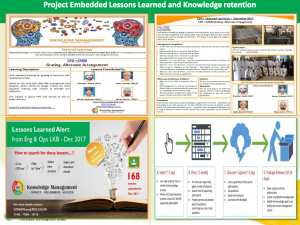
And I like that Ipsos (Market Research) have built a Knowledge Centre for the firm headed by CKO Simon Atkinson and remain focused on being great publishers.

Ipsos’ publishing model
Favourite quotes
- “We have to be digitally savvy” – be there front and centre, embrace automation to do the analysis – be agile! Be in different places all at once. Focus on those that activities that cannot be automated. Sue Mucenieks at EY
- Liz Hobbs of TfL Quoting McKinsey – 40% productivity surge if we learn and apply lessons from projects! “What creates a good lesson?” It can impact our future operations. What can we do to make the next project better and improve our StageGate process?
- ISO KM Standard will not tell you how to do KM. It provides a framework that hopefully will help organisations get a good start, that doesn’t take months to implement. No mandatory requirement, no need to certify, primarily for internal use until the time comes when you can be audited by external assesors. Nick Milton
- “Personalization lifts the burden… creates the feeling of being special and cared for…ensures loyalty”. Nicky Leitjens
- “Challenge is for technology to help by improving the analytics so we can personalise curated knowledge”. Andrew Trickett
- The KM team needs to be the enablers, facilitating and training others to deliver value from lessons learned and continuous improvements. Hank Malik
- Role of KM is connecting. Help Desk run by Center of Excellence allows Global 24×7 support. Kim Glover
‘The Chartered Knowledge Manager’
Nick Poole CEO of CILIP made an appearance this year at my suggestion. If you’ve read “Navigating the Minefield: A Practical KM Companion” then you might recall that in Chapter 7 What surprised us, Surprise #8 was: Few KMers have formal KM qualifications. Having taught on various MBA’s / MSc’s in Knowledge Management that come and go I’ve long argued the case for an independent globally recognised accreditation from an industry body. Marketeers have CMI, HR professionals, CIPD but KM’ers? CILIP being established by Royal Charter is well placed to plug that gap.
Is there a need? I’d argue most definitely since 2/3rds of those in the room for his presentation expressed an interest in being part of the initial trial. Having run Masterclasses in Africa, Asia, Europe & The Middle East in the past decade I know how many of the attendees require certificates of attendance and completion. Such certificates might be prized but they carry limited weight with Human Resources / Personnel or an organisation’s senior executive cadre.
The imminent arrival of the ISO KM Standards (albeit that adherence is voluntary) provides a framework against which KM Programs can be viewed. An independently assessed external accreditation is another key component of the KM practitioner’s path to corporate legitimacy.
My KM Summit Wordle
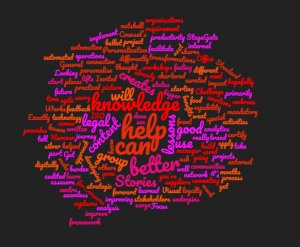 I thought it might be interesting to run the top tweets from #KMSummit18 through a wordle to see what stood out. Interestingly it did not surface any of the 4 words that arose from my conversations:
I thought it might be interesting to run the top tweets from #KMSummit18 through a wordle to see what stood out. Interestingly it did not surface any of the 4 words that arose from my conversations:
- Agile
- Digital
- Informed
- Opportunistic
And finally

“Looking back to look forward”
The closing plenary session “KM competencies: A day in the life of a knowledge manager in 2020“ which I ran was lively with lots of great ‘takeaways’.
The value of the exercise is giving people the chance to reflect individually, in groups and then with other groups.
It’s amazing how we all see and hear different things and this exercise gives people a chance to share and absorb.
To conclude I want to draw on Ipsos again. Simon noted it had taken them 3 years to achieve what they have. His tips are worth airing:

Ipsos’ Tips

 A year on from the
A year on from the 